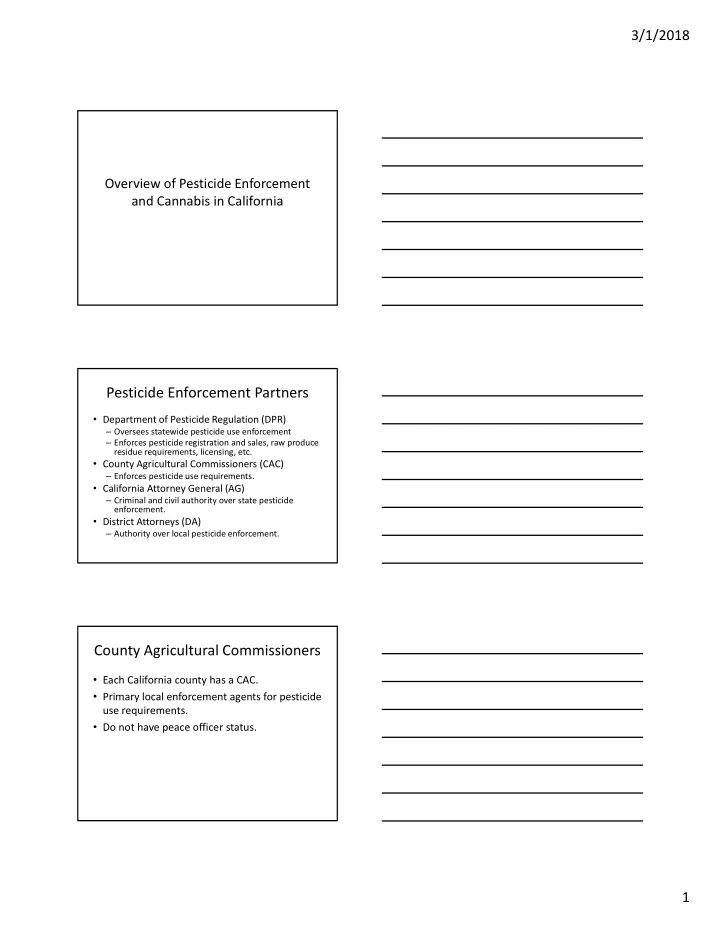

3/1/2018 Overview of Pesticide Enforcement and Cannabis in California Pesticide Enforcement Partners • Department of Pesticide Regulation (DPR) – Oversees statewide pesticide use enforcement – Enforces pesticide registration and sales, raw produce residue requirements, licensing, etc. • County Agricultural Commissioners (CAC) – Enforces pesticide use requirements. • California Attorney General (AG) – Criminal and civil authority over state pesticide enforcement. • District Attorneys (DA) – Authority over local pesticide enforcement. County Agricultural Commissioners • Each California county has a CAC. • Primary local enforcement agents for pesticide use requirements. • Do not have peace officer status. 1
3/1/2018 Role of the CAC’s • Investigates complaints and reported pesticide ‐ related illnesses • Inspects agricultural fields • Issues restricted material permits and operator identification numbers • Provides compliance assistance, enforces pesticide use violations through administrative civil penalty actions, or refers cases to the DA. Administrative Penalties • FAC section 12999.5 • CAC has exclusive jurisdiction • Up to $5,000 administrative civil penalty per violation Civil Penalties • FAC section 12997 • In lieu of administrative civil penalty, DPR may refer cases to the California AG • Civil penalty of $1,000 to $10,000 • Repeat violations ‐ or ‐ intentional violations involving human health or environmental hazard subject to civil penalty of $5,000 to $25,000 2
3/1/2018 Criminal Penalties • FAC section 12996 • Misdemeanor violations – $500 to $5,000 criminal penalty, and/or – Imprisonment of not more than six (6) months • Repeat violations – $1,000 to $10,000 criminal penalty, and/or – Imprisonment of not more than six (6) months • Intentional ‐ or ‐ negligent violations involving health or environmental hazards – $5,000 to $50,000 criminal penalty, and/or – Imprisonment in county jail/state prison of not more than one (1) year Pesticide Requirements under MAUCRSA (SB 94) • DPR: – Guidance on legal pest management to growers. – Guidance on pesticide residue levels to the Bureau of Cannabis Control (BCC). • Department of Food and Agriculture (CDFA): – Licenses and regulates cannabis cultivators. – Compliance with pesticide laws as enforced by DPR is a condition of CDFA cannabis cultivation licenses. • BCC: – Licenses and regulates cannabis testing laboratories. – BCC sets allowable levels for pesticide residue (and other contaminants) on processed cannabis/cannabis products after considering the DPR guidance. Role of the CAC’s – Legal (Licensed) Cannabis • To inspect and investigate licensed cannabis cultivation operations to determine compliance with California pesticide use requirements. • Provide compliance assistance and take enforcement actions where appropriate. 3
3/1/2018 Role of the CAC’s – Illegal (Unlicensed) Cannabis • CAC’s do not generally enter, inspect, or enforce against illegal cannabis grow sites because they do not enforce criminal violations and do not have peace officer status. • DPR is available and encourages CAC’s to be available to assist law enforcement in case ‐ building activities such as identifying, handling, and sampling pesticides found at illegal grows. California Pesticide Laws • California Food and Agricultural Code (FAC), Divisions 6 and 7 • California Code of Regulations (CCR), Title 3 Examples of Pesticide Use Violations • FAC section 12973 – Use in conflict with the label. • FAC section 12995 – Possession or use of an unregistered pesticide. • FAC sections 14011; 14015 – Unlawful use or possession of restricted materials. • FAC section 12991(e) – Unlawful pesticide use, transport, storage, handling, or disposal. 4
3/1/2018 Examples of Pesticide Use Violations • FAC section 12972; 3 CCR 6614 – Pesticide drift. • 3 CCR 6670, et seq. – Storage, transportation, and disposal of pesticides. • 3 CCR 6609; 3 CCR 6800, et seq. – Restrictions on pesticide use near wellheads and groundwater contamination prevention. Pesticide use enforcement and Cannabis • Under California law, pesticides must be used consistent with the registered labeling. • All pesticides are first registered with the federal EPA. Because cannabis is illegal federally, there are no pesticides registered for use on “cannabis.” • Even under these facts, there are still some pesticides that are legal to use on cannabis under state law. Pesticides that are Legal to Use on Cannabis under State Law 1) Exempt from tolerance requirements AND 2) Exempt from registration, or registered for a use site that is broad enough to include cannabis DPR has released a document discussing legal pest management practices. 5
3/1/2018 Pesticides that cannot be Used on Cannabis • DPR has released a document listing pesticides that DPR has instructed the CAC’s to prioritize enforcement against: ‐ Labeled with a “DANGER” signal word; ‐ Not registered for food uses; ‐ Groundwater protection list. Contact • Daniel Rubin, DPR Staff Attorney Daniel.Rubin@cdpr.ca.gov (916) 324 ‐ 2666 • Rachel Kubiak, DPR Cannabis Program Supervisor Rachel.Kubiak@cdpr.ca.gov (916) 445 ‐ 5010 • County Agricultural Commissioners https://www.cdfa.ca.gov/exec/county/countymap/ 6
Recommend
More recommend